Paul Levinson's Blog: Levinson at Large, page 238
November 13, 2016
Westworld 1.7: The Story of the Story
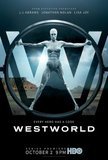 "I don't wanna be in a story," Delores says to William, who later provides the best possible Westworld answer, telling Delores the life he's been living outside is a lie, and the most truth he's ever known is in Westworld with her. (Note that in this sentence, the italics denote the series, and the name Westworld denotes the place in the series.)
"I don't wanna be in a story," Delores says to William, who later provides the best possible Westworld answer, telling Delores the life he's been living outside is a lie, and the most truth he's ever known is in Westworld with her. (Note that in this sentence, the italics denote the series, and the name Westworld denotes the place in the series.)That's indeed a great storyline - both inside Westworld and outside on Westworld on HBO - but it's nothing compared to what's in store for us in and in and on Westworld at the end of this hour.
Now I can't and won't say I was totally surprised. In a previous review I said that Bernard was more predictable than Ford - which is why I liked Ford better - and now we find out why. Bernard is a sophisticated host. He's been programmed to be a programmer - nice!
Not only that, he has no problem killing guests when so commanded by Ford. The upshot in this overthrow of Asimov's First Law: the hosts are not evolving towards sentience - Ford and/or Arnold have made them that way.
Not that Bernard killed Cullen on his own or in his own defense - he was ordered to do this by Ford, to prevent Bernard from being fired, which was not in Ford's plan.
But the fact that a host can be programmed to kill on command means that a host can be programmed to do almost anything, I'd guess, including evolve to non-programmed sentience, and that's a fine kettle ideational fish indeed.
All of that in addition to a great train robbery by former Confederates with Indians checking in make Westworld one hell of a ride of a series.
See also Westworld 1.1: Isaac Asimov and Philip K. Dick Served Up by Jonathan Nolan, Lisa Joy, and J. J. Abrams ... Westworld 1.2: Who Is the Man in Black? ... Westworld 1.3: Julian Jaynes and Arnold ... Westworld 1.4: Vacation, Connie Francis, and Kurt Vonnegut ... Westworld 1.5: The Voice Inside Dolores ... Westworld 1.6: Programmed Unprogramming
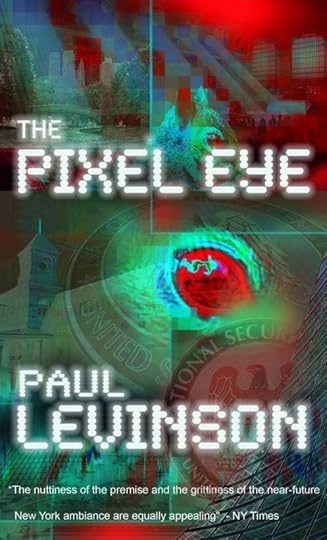
paradoxes of AI abound
Paul Levinson's books ... Paul Levinson's music
Published on November 13, 2016 19:52
November 12, 2016
Cafe du Lievre and Twice Upon a Rhyme
 I think my favorite cafe in the world is the Cafe du Lievre, in Inokashira Forest, in Tokyo. I've never had the pleasure of dining there - though I hope to some day - but...
I think my favorite cafe in the world is the Cafe du Lievre, in Inokashira Forest, in Tokyo. I've never had the pleasure of dining there - though I hope to some day - but...Well, the cafe has been playing my songs - hey, baby, they're playing our song - from my Twice Upon a Rhyme album, and, come to think of it, from my Spun Dreams album, too, for more than a year. So far, as far as can tell, patrons haven't been running out of the cafe in horror, so I take that as a good sign.
But it brings me pleasure no end to think that all of those songs, written for the most part in the late 1960s and recorded just a few years later, are now enjoying a life of the ear in this cafe on the other side of world. Japan has already played a crucial role in my musical re-discovery, with the review of Twice Upon a Rhyme by Taro Miyasugi in Record Collectors Magazine at the turn of the 21st century - "human mystical pop music ... wonderful songs" - really jumpstarting this resurgence of interest (though I'm not sure how much there was in the first place) which is still going on.
Thanks Cafe du Lievre - having seen your taste in music, you can count on me one of these showing up and sampling your taste in food!
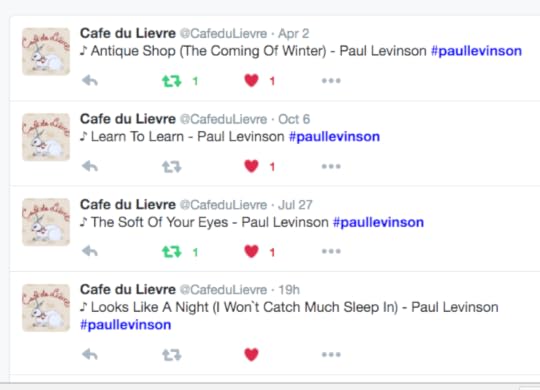
with original Twice Upon a Rhyme guitarist Peter Rosenthal, August 2015 Paul Levinson's books ... Paul Levinson's music
Published on November 12, 2016 10:55
Dominic Balestra, RIP
It's been a week of deep loss - of people I didn't know personally whose work made a difference in my life, of people I did know personally whose work made a difference, of perhaps - though I hope not - of something in America itself which many of us hold very dear.
Back in the day - actually, just a decade ago, but time flies when you're having a good time - Dom Balestra and I did some good things together at Fordham University, when he was Dean of Faculty and I was Chair of the Communication and Media Studies Department. A few years earlier, in the summer of 1998, Dom was the first person who interviewed me when I first came to Fordham seeking a job as a professor.
We already knew each other. The first time we met was when Dom came up to me after the conference about Karl Popper and his philosophy that I had organized at the Prince George Hotel in Manhattan. (It's also been week for remembering seedy hotels - just yesterday I was recalling how I had met someone who claimed to be Leonard Cohen's Suzanne, in the Milburn Hotel on West 76th Street.)
Dom had love of philosophy of technology, as did I, which is why our paths first crossed at that conference. It provided a great basis of conversation years later at Fordham, where I briefed Dom on McLuhan, he briefed me on Spinoza, and we discussed everyone and everything in between.
Most academics have a love of knowledge in one way or another. Dominic Balestra embodied it, and epitomized what it literally meant to be a philosopher. After the funeral, a colleague said to me, as I mentioned what I said above about this being an especially tough week, that Dom died at the right time, so he didn't have to see what had happened in America.
True enough. But, even though we hadn't spoken in years, it would be wonderful indeed if I could talk to Dom right now and get his sage, thoughtful views of our world and its dangers.
Paul Levinson's books ... Paul Levinson's music
Back in the day - actually, just a decade ago, but time flies when you're having a good time - Dom Balestra and I did some good things together at Fordham University, when he was Dean of Faculty and I was Chair of the Communication and Media Studies Department. A few years earlier, in the summer of 1998, Dom was the first person who interviewed me when I first came to Fordham seeking a job as a professor.
We already knew each other. The first time we met was when Dom came up to me after the conference about Karl Popper and his philosophy that I had organized at the Prince George Hotel in Manhattan. (It's also been week for remembering seedy hotels - just yesterday I was recalling how I had met someone who claimed to be Leonard Cohen's Suzanne, in the Milburn Hotel on West 76th Street.)
Dom had love of philosophy of technology, as did I, which is why our paths first crossed at that conference. It provided a great basis of conversation years later at Fordham, where I briefed Dom on McLuhan, he briefed me on Spinoza, and we discussed everyone and everything in between.
Most academics have a love of knowledge in one way or another. Dominic Balestra embodied it, and epitomized what it literally meant to be a philosopher. After the funeral, a colleague said to me, as I mentioned what I said above about this being an especially tough week, that Dom died at the right time, so he didn't have to see what had happened in America.
True enough. But, even though we hadn't spoken in years, it would be wonderful indeed if I could talk to Dom right now and get his sage, thoughtful views of our world and its dangers.
Paul Levinson's books ... Paul Levinson's music
Published on November 12, 2016 09:34
November 11, 2016
Designated Survivor 1.6: The Governors
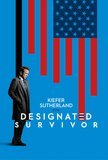 Watching Designated Survivor 1.6 the other night, after our own Presidential election came to a conclusion in what passes these days for the real world, was almost too much, or maybe too little, because in some ways the show seemed less insane. But I digress ...
Watching Designated Survivor 1.6 the other night, after our own Presidential election came to a conclusion in what passes these days for the real world, was almost too much, or maybe too little, because in some ways the show seemed less insane. But I digress ...The episode mined a new element in the series, perfectly plausible when you think about it: with almost all of our Senators and Congresspeople wiped out in the terrorist blast, the new President needs to turn to ... the governors of our states, who are empowered in laws to appoint successors when a Senator dies or otherwise suddenly leaves office.
Designed Survivor presented this well. The assembled governors don't trust President Kirkman, who after all wasn't elected, and who was also actually serving his last day as the lowly HUD Secretary, anyway. So they subject him to a trial via a barrage of pointed questions.
Meanwhile, we learn what was already clear - the catastrophic attack was not the doing of the Islamic terrorist picked up in the raid last week. So who was behind it? Likely some domestic group, likely someone who was pretty high up in the government, is the best guess right now.
The surviving Congressman, on queue to become Vice President, was likely involved in this. Was there any foreign involvement at all? How prescient will Designated Survivor turn out to be? Will a Russian President turn out to have had a hand in the Capitol bombing?
Designated Survivor couldn't have been made with knowledge of what happened this past Tuesday. On the other hand, it wasn't made that long ago, and certainly was informed by what was already going on in our country last year. In fact, in this week's episode, and in previous hours, hostility towards immigration plays a big role.
It will be especially good to see how Designated Survivor and our real world continue to coincide - good to see what's going on in Designated Survivor, that is.
See also Designated Survivor: Jack Bauer Back in the White House ... Designated Survivor 1.2: Unflinching and Excellent ... Designated Survivor 1.4: "Michigan's on the Verge of Anarchy" ... Designated Survivor 1.5: The Plot Thickens

terrorist squirrels and bombs in NYC
#SFWApro
Paul Levinson's books ... Paul Levinson's music
Published on November 11, 2016 22:49
November 10, 2016
The Night I Met a Woman Who Said She Was Leonard Cohen's Suzanne
Leonard Cohen passed on a few days ago. His songs, especially Suzanne, will live on forever. Or as Shelley said about Keats, great poets like Cohen, from a previous century, "tis death that's dead not he".
I once met a woman who said she was the Suzanne who had inspired Cohen's song. Ed Fox and I met her in the lobby of that slightly seedy hotel - the Milburn - off Broadway and 76th Street, as we were on our way into Herb Abramson's A-1 Sound Studio, to record some tracks on our Twice Upon a Rhyme album.
That would have been in 1969, a few months after Cohen's "Suzanne" had been playing on the radio and in our heads. Ed and I were standing in the hotel lobby, waiting for a moment for one of the musicians on our album to arrive. A woman in her 20s struck up a conversation with us. We told her we were making an album. She asked what kind of songs. We said, you know, the Beatles circa Rubber Soul, Dylan Blonde on Blonde, Bob Lind, Leonard Cohen ... those kinds of songs.
She smiled ... elusively. And told us that she was Suzanne. We of course knew what she meant and of course we didn't believe her - not at all, not at first.
But we ran into her in that lobby a few times in the succeeding weeks. And she told us things - about her and Leonard, nothing we could confirm. certainly not in that age so long ago, long before Google.
But Ed and I believed her. And I believe her to this very day. Hey, Suzanne could still be alive ... somewhere ... maybe she's even reading this blog post, or will someday.
You did well, Suzanne. You inspired one of the great, beautifully plaintiff, soul touching songs, as delicate as a leaf at the edge of a hurricane. (Here's a BBC interview with Suzanne Verdal from 1998.)
Rest in peace, Leonard Cohen.
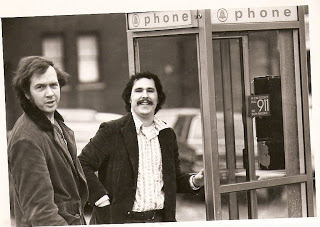
Ed Fox and Paul Levinson, not long after meeting Suzanne
I think we were singing this Bob Lind song as we were walking to the
Milburn that night - maybe that had something to do with it Paul Levinson's books ... Paul Levinson's music
I once met a woman who said she was the Suzanne who had inspired Cohen's song. Ed Fox and I met her in the lobby of that slightly seedy hotel - the Milburn - off Broadway and 76th Street, as we were on our way into Herb Abramson's A-1 Sound Studio, to record some tracks on our Twice Upon a Rhyme album.
That would have been in 1969, a few months after Cohen's "Suzanne" had been playing on the radio and in our heads. Ed and I were standing in the hotel lobby, waiting for a moment for one of the musicians on our album to arrive. A woman in her 20s struck up a conversation with us. We told her we were making an album. She asked what kind of songs. We said, you know, the Beatles circa Rubber Soul, Dylan Blonde on Blonde, Bob Lind, Leonard Cohen ... those kinds of songs.
She smiled ... elusively. And told us that she was Suzanne. We of course knew what she meant and of course we didn't believe her - not at all, not at first.
But we ran into her in that lobby a few times in the succeeding weeks. And she told us things - about her and Leonard, nothing we could confirm. certainly not in that age so long ago, long before Google.
But Ed and I believed her. And I believe her to this very day. Hey, Suzanne could still be alive ... somewhere ... maybe she's even reading this blog post, or will someday.
You did well, Suzanne. You inspired one of the great, beautifully plaintiff, soul touching songs, as delicate as a leaf at the edge of a hurricane. (Here's a BBC interview with Suzanne Verdal from 1998.)
Rest in peace, Leonard Cohen.

Ed Fox and Paul Levinson, not long after meeting Suzanne
I think we were singing this Bob Lind song as we were walking to the
Milburn that night - maybe that had something to do with it Paul Levinson's books ... Paul Levinson's music
Published on November 10, 2016 21:12
Leonard Cohen, RIP
Leonard Cohen passed on a few days ago. His songs, especially Suzanne, will live on forever. Or as Shelley said about Keats, great poets like Cohen, from a previous century, "tis death that's dead not he".
I once met a woman who said she was the Suzanne who had inspired Cohen's song. Ed Fox and I met her in the lobby of that slightly seedy hotel - the Milburn - off Broadway and 76th Street, as we were on our way into Herb Abramson's A-1 Sound Studio, to record some tracks on our Twice Upon a Rhyme album.
That would have been in 1969, a few months after Cohen's "Suzanne" had been playing on the radio and in our heads. Ed and I were standing in the hotel lobby, waiting for a moment for one of the musicians on our album to arrive. A woman in her 20s struck up a conversation with us. We told her we were making an album. She asked what kind of songs. We said, you know, the Beatles circa Rubber Soul, Dylan Blonde on Blonde, Bob Lind, Leonard Cohen ... those kinds of songs.
She smiled ... elusively. And told us that she was Suzanne. We of course knew what she meant and of we didn't believe her - not at first.
But we ran into her in that lobby a few times in the succeeding weeks. And she told us things - about her and Leonard, nothing we could confirm. certainly not in that age so long ago, long before Google.
But Ed and I believed her. And I believe her to this very day. Hey, Suzanne could still be alive ... somewhere ... maybe she's even reading this blog post, or will someday.
You did well, Suzanne. You inspired one of the great, beautifully plaintiff, soul touching songs, as delicate as a leaf at the edge of a hurricane. (Here's a BBC interview with Suzanne Verdal from 1998.)
Rest in peace, Leonard Cohen.
Paul Levinson's books ... Paul Levinson's music
I once met a woman who said she was the Suzanne who had inspired Cohen's song. Ed Fox and I met her in the lobby of that slightly seedy hotel - the Milburn - off Broadway and 76th Street, as we were on our way into Herb Abramson's A-1 Sound Studio, to record some tracks on our Twice Upon a Rhyme album.
That would have been in 1969, a few months after Cohen's "Suzanne" had been playing on the radio and in our heads. Ed and I were standing in the hotel lobby, waiting for a moment for one of the musicians on our album to arrive. A woman in her 20s struck up a conversation with us. We told her we were making an album. She asked what kind of songs. We said, you know, the Beatles circa Rubber Soul, Dylan Blonde on Blonde, Bob Lind, Leonard Cohen ... those kinds of songs.
She smiled ... elusively. And told us that she was Suzanne. We of course knew what she meant and of we didn't believe her - not at first.
But we ran into her in that lobby a few times in the succeeding weeks. And she told us things - about her and Leonard, nothing we could confirm. certainly not in that age so long ago, long before Google.
But Ed and I believed her. And I believe her to this very day. Hey, Suzanne could still be alive ... somewhere ... maybe she's even reading this blog post, or will someday.
You did well, Suzanne. You inspired one of the great, beautifully plaintiff, soul touching songs, as delicate as a leaf at the edge of a hurricane. (Here's a BBC interview with Suzanne Verdal from 1998.)
Rest in peace, Leonard Cohen.
Paul Levinson's books ... Paul Levinson's music
Published on November 10, 2016 21:12
President-Elect Trump Shows His True Colors - Already
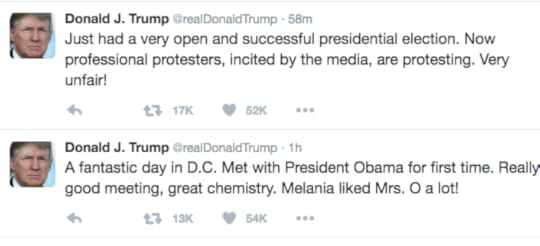
Didn't take long. Those two tweets by Trump say it all. Anyone who was hoping that being elected President might have changed him, now has an answer: it hasn't.
He's still a little man, with a skin the thinnest of which we've never seen in public office, let alone the Oval Office.
Hours after Trump has a meeting with Obama, in which the two were gracious, even heartening, Trump can't contain himself about the protests erupting all over America.
They weren't incited by the media, Mr. President-Elect. They were incited by your outrageous, bigoted, vicious pronouncements made in such abundance throughout your campaign. And maybe a little by the fact that the majority of the American people did not vote for you.
And you know wha else? Those protesters are the best America has to offer, and they are protected in the protests by the First Amendment.
Ever hear of that? Sure you have - I heard you complaining during the campaign that you think our First Amendment gives the media too much protection. Better get used to it - it's here to stay, as are the media.
And as you are not. The four years will pass very quickly, and you'll be voted out of office. Paul Levinson's books ... Paul Levinson's music
Published on November 10, 2016 19:32
Frequency 1.6: Another Time Traveler?
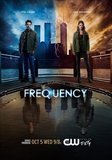 A big question not answered in a satisfying way in the original Frequency movie, and so far not in the series, is how and why the radio connection between Raimy and her father Frank got created. Episode 1.6 provides, perhaps, a clue.
A big question not answered in a satisfying way in the original Frequency movie, and so far not in the series, is how and why the radio connection between Raimy and her father Frank got created. Episode 1.6 provides, perhaps, a clue.The clue comes from the psycho Raimy talks to in prison. He's a physicist, and claims he's connected to his own future self - via a device he built. Other than the mad-scientist, homicidal aspects of this guy, can we take his story seriously and does the machine he says he built for himself have any connection to Raimy's?
Possibly on the first question, no information on the second. The mad scientist seems to have knowledge of value to Raimy. Whether it came from the machine he wants to rebuild is not clear at all.
But introducing this new character is a good move in our story, because it takes the connection between Raimy and Frank out of the incredible quirk category (the movie's "explanation") into what may be something much greater, with who knows what consequences.
This is more important than the mad scientist's talk about not being able to change the course of history by cutting off a branch from the tree, because the tree will just put up another branch, which means that the only way you can change history is by cutting the tree down - sawing it off at the trunk. This makes sense enough, but leaves open the question of what, in any situation, is the branch and what is the trunk?
Frequency the television series continues to be an enjoyable time-travel narrative - via trunk and branches. May it thrive.
See also Frequency 1.1: Closely Spun Gem ... Frequency 1.2: All About the Changes ... Frequency 1.3: Chess Game Across Time ... Frequency 1.4: Glimpsing the Serial Killer ... Frequency 1.5: Two Sets of Memories
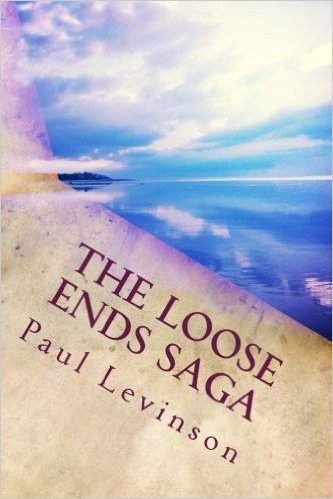
more time travel
Paul Levinson's books ... Paul Levinson's music
Published on November 10, 2016 10:32
November 9, 2016
Yesterday's Election and the Cheapening of the Presidency
It's now a little more than the day following Trump's election. It's late at night, or early in the next morning, about 24 hours after Trump was declared the President-elect.
And I'm thinking: What most bothers me about Trump's election to this office is how it cheapens the Presidency. Maybe people felt that way when James Buchanan or Warren Harding was elected President. I don't know, I wasn't around then, but those guys, and the worst of our Presidents, at least had a little experience in some kind of government job before their election.
Reagan was an entertainer for most of his life, but he was also Governor of California for two terms. Grant and Eisenhower were generals. Woodrow Wilson was an academic for most of his life, but he was also Governor of New Jersey for two years before he was elected President.
And Trump? No political office, no position of any public authority, elected or appointed, whatsoever. His complete credentials can be summed up as real estate tycoon and entertainer. And as I told Eyewitness News in New York in the interview below, conducted earlier today, that's probably more than anything else what got him known and elected as President yesterday.
And that cheapens the office, whatever Trump's policies, whatever he may go on to do. The Presidency for me, this day, and I'm guessing for every day forward, will never be the same - I'll never look at it, think of it, in the same way. I'll think of it as something less than I've thought it my entire life.
Later today, Barack Obama, who will be the President to end the succession of people to the office with any credentials worthy of the office, will be meeting with Donald Trump, who has no credentials at all. It will symbolize, as will the two of them on Inauguration Day, something very sad, the passing of the baton of American leadership to a place sharply downward and unimaginable until this year.
Paul Levinson's books ... Paul Levinson's music
And I'm thinking: What most bothers me about Trump's election to this office is how it cheapens the Presidency. Maybe people felt that way when James Buchanan or Warren Harding was elected President. I don't know, I wasn't around then, but those guys, and the worst of our Presidents, at least had a little experience in some kind of government job before their election.
Reagan was an entertainer for most of his life, but he was also Governor of California for two terms. Grant and Eisenhower were generals. Woodrow Wilson was an academic for most of his life, but he was also Governor of New Jersey for two years before he was elected President.
And Trump? No political office, no position of any public authority, elected or appointed, whatsoever. His complete credentials can be summed up as real estate tycoon and entertainer. And as I told Eyewitness News in New York in the interview below, conducted earlier today, that's probably more than anything else what got him known and elected as President yesterday.
And that cheapens the office, whatever Trump's policies, whatever he may go on to do. The Presidency for me, this day, and I'm guessing for every day forward, will never be the same - I'll never look at it, think of it, in the same way. I'll think of it as something less than I've thought it my entire life.
Later today, Barack Obama, who will be the President to end the succession of people to the office with any credentials worthy of the office, will be meeting with Donald Trump, who has no credentials at all. It will symbolize, as will the two of them on Inauguration Day, something very sad, the passing of the baton of American leadership to a place sharply downward and unimaginable until this year.
Paul Levinson's books ... Paul Levinson's music
Published on November 09, 2016 22:28
The Day After Trump Was Elected
I always try to look for paths through adversity, for reasons to take hope in difficult situations. Some times that's more difficult than others. But there's usually something there.
Here are a few of my thoughts -
The racist Sheriff Joe Arpaio was voted out of office.Hillary Clinton is on track to win the national popular vote. Someday in the future, our country will do away with the Electoral College, and its disenfranchisement of people in big states, and what happened last night will be a prime reason. (This is the fourth time in our history that a winner of the popular vote lost in the Electoral College - it happened to Samuel Tilden in 1876, Grover Cleveland in 1888, Al Gore in 2000 - via a Supreme Court decision that stopped a Florida recount - and now Hillary Clinton in 2016. All four were Democrats.)We still have a Constitution. President Trump may ignore it, but we still have a court system. with judges not appointed by Trump, and if he oversteps his bounds, we can expect this check-and-balance to work in at least some cases. Even Republican justices sometimes do the right thing - Chief Justice Roberts supported Obamacare.As for blame, there's more than enough to go around -
The polls were way off in many states. We've known the polling is an inexact science, to say the least, ever since the Literary Digest poll predicted FDR would lose by a landslide in 1936. In the aftermath of that, and subsequent miscalls, polling methods were improved. The same mistakes were not repeated. New mistakes were made. This is the way of progress.The media coverage of Donald Trump was abysmally uneven, offering too little critical coverage far too late. The prospects for improvement of media coverage are not as good as for improvement of polling, but there might be some lessons learned.Winston Churchill is said to have said that "democracy is the least worst form of government". Whether he said it not, the observation is profound and true. The values that so many hold dear took a beating last night. But that's the way of the democratic process. We still have our democracy, and we need to do whatever we can to make it work.
========
PS - As for why Trump won, here are my McLuhanesque reflections, from back in September, at The Players Club in New York City. I begin with answering an earlier question about why Trump's speech is protected by the First Amendment...
Paul Levinson's books ... Paul Levinson's music
Here are a few of my thoughts -
The racist Sheriff Joe Arpaio was voted out of office.Hillary Clinton is on track to win the national popular vote. Someday in the future, our country will do away with the Electoral College, and its disenfranchisement of people in big states, and what happened last night will be a prime reason. (This is the fourth time in our history that a winner of the popular vote lost in the Electoral College - it happened to Samuel Tilden in 1876, Grover Cleveland in 1888, Al Gore in 2000 - via a Supreme Court decision that stopped a Florida recount - and now Hillary Clinton in 2016. All four were Democrats.)We still have a Constitution. President Trump may ignore it, but we still have a court system. with judges not appointed by Trump, and if he oversteps his bounds, we can expect this check-and-balance to work in at least some cases. Even Republican justices sometimes do the right thing - Chief Justice Roberts supported Obamacare.As for blame, there's more than enough to go around -
The polls were way off in many states. We've known the polling is an inexact science, to say the least, ever since the Literary Digest poll predicted FDR would lose by a landslide in 1936. In the aftermath of that, and subsequent miscalls, polling methods were improved. The same mistakes were not repeated. New mistakes were made. This is the way of progress.The media coverage of Donald Trump was abysmally uneven, offering too little critical coverage far too late. The prospects for improvement of media coverage are not as good as for improvement of polling, but there might be some lessons learned.Winston Churchill is said to have said that "democracy is the least worst form of government". Whether he said it not, the observation is profound and true. The values that so many hold dear took a beating last night. But that's the way of the democratic process. We still have our democracy, and we need to do whatever we can to make it work.
========
PS - As for why Trump won, here are my McLuhanesque reflections, from back in September, at The Players Club in New York City. I begin with answering an earlier question about why Trump's speech is protected by the First Amendment...
Paul Levinson's books ... Paul Levinson's music
Published on November 09, 2016 07:41
Levinson at Large
At present, I'll be automatically porting over blog posts from my main blog, Paul Levinson's Infinite Regress. These consist of literate (I hope) reviews of mostly television, with some reviews of mov
At present, I'll be automatically porting over blog posts from my main blog, Paul Levinson's Infinite Regress. These consist of literate (I hope) reviews of mostly television, with some reviews of movies, books, music, and discussions of politics and world events mixed in. You'll also find links to my Light On Light Through podcast.
...more
- Paul Levinson's profile
- 342 followers



